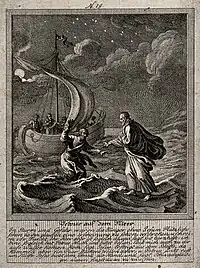Matthew 14:29
Matthew 14:29 is a verse in the fourteenth chapter of the Gospel of Matthew in the New Testament.
| Matthew 14:29 | |
|---|---|
← 14:28 14:30 → | |
 "Peter walks on water towards Christ". Etching. Welcome Collection Gallery | |
| Book | Gospel of Matthew |
| Christian Bible part | New Testament |
Content
In the original Greek according to Westcott-Hort for this verse is:
- Ὁ δὲ εἶπεν, Ἐλθέ. Καὶ καταβὰς ἀπὸ τοῦ πλοίου ὁ Πέτρος περιεπάτησεν ἐπὶ τὰ ὕδατα, ἐλθεῖν πρὸς τὸν Ἰησοῦν.
In the King James Version of the Bible the text reads:
- And he said, Come. And when Peter was come down out of the ship, he walked on the water, to go to Jesus.
The New International Version translates the passage as:
- "Come," he said. Then Peter got down out of the boat, walked on the water and came toward Jesus.
Analysis
This verse shows the remarkable faith of Peter in Jesus. It is said that the Lord worked this miracle either by keeping Peter up with divine power, or by making the water firm and solid.[1][2]
Commentary from the Church Fathers
Jerome: "Let those who think that the Lord’s body was not real, because He walked upon the yielding waters as a light æthereal substance, answer here how Peter walked, whom they by no means deny to be man."[3]
Rabanus Maurus: "Lastly, Theodorus wrote that the Lord had not bodily weight in respect of His flesh, but without weight walked on the sea. But the catholic faith preaches the contrary; for Dionysius says that He walked on the wave, without the feet, being immersed, having bodily weight, and the burden of matter."[3]
References
- John MacEvilly, An Exposition of the Gospel of St. John consisting of an analysis of each chapter and of a Commentary critical, exegetical, doctrinal and moral, Dublin Gill & Son 1879.
- Cornelius Cornelii a Lapide; Thomas Wimberly Mossman The great commentary of Cornelius à Lapide, London: J. Hodges, 1889-1896.
- "Catena Aurea: commentary on the four Gospels; collected out of the works of the Fathers. Oxford: Parker, 1874. Thomas Aquinas".
 This article incorporates text from this source, which is in the public domain.
This article incorporates text from this source, which is in the public domain.